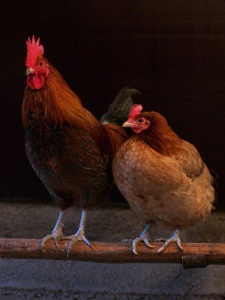If humanity ever intends upon on settling Mars (by settling I mean a one way trip with no plans on returning back to Earth), they are going to need a whole lot of chickens if they want to survive–let alone thrive–upon the red planet.
Aside from providing an excellent source of protein, chickens could help future settlers raise not only crops (such as wheat, barely, etc.) upon the barren Martian soil, but also help colonists keep the lights on through a very useful by-product (aka chicken dung).
Unlike Earth, Martian dirt is very hostile towards plant life. Unless we can genetically alter plants to grow upon the red planets soil, future settlers will have to heavily rely upon the home world for their daily bread.
Future scientists could help reduce or (even better) eliminate that need by using chicken manure, which (as far as animal dung goes) has one of the highest concentration of nutrients available, making it a perfect choice for raising plants on Mars.
But providing food for plants isn’t the only reason why future Martian colonists will probably choose these ugly (yet useful) creatures, as chicken dung can also be used for energy as well.
Using an old scientific process called pyrolysis (which is cooking biomass like manure without the presence of oxygen), future settlers could turn this smelly chicken manure into biochar (which is a charcoal like product).
Just like many farmers on Earth, future colonists could turn biochar into bio-fuel, helping to power their future space settlements along with Martian solar panels (or an underground nuclear reactor).
While other types of animals manure could also be used for raising crop or keeping the lights on, it would be much easier (not to mention cheaper) transporting chickens en mass than larger animals.
This is mainly due to the fact than an egg (averaging about 57 grams), weigh much less than say, a baby calf (which would weigh 32 kilograms at birth), making chickens the logical choice as far as future space animals go.
Although humans may eventually import other animals to Mars (whether for food or as pets), it may not be surprising to see chickens accompany future explorers in their quest to conquer the red planet.
Image Credit: Andrei Niemimäki via Flickr
Sources: New York Times, Ezine Articles, Wise Geek


Is it truly a necessity to take any animals with us to Mars, at least in the early years of manned missions? Seems it would be prohibitively expensive.
I’m scratching my head on a couple of points here…
#1: Granted carrying fertilised eggs to Mars is cheaper than carrying full grown animals… but how much food do you need to grow a chicken? Certainly more (in weight) than the animal itself.
#2: Where would the food to feed the chickens come from? If we need 2kg of grain to get 1kg of manure, and 2kg of manure to grow a kg of grain, the system is flawed…
#3: Where’s the O2 needed to burn the biofuel?
🙂
Nice headline, luring us in by making us think that “(martian settlers may need) (chickens to conquer the Red Planet)” instead of “(martian settlers may need chickens) (to conquer the Red Planet)”.
For my part, I wouldn’t say I need chickens to conquer the Red Planet, but I look forward to reading Universe Today’s coverage of the story when they do.
Anybody remotely interested in manned Mars exploration, settlement & colonisation should read “The Case for Mars”, by Robert Zubrin.
Hi All
Chickens are very efficient at turning what they eat into protein that we can use – much, much more so than large mammals.
However why bother with animals at all? Tissue culture is almost at the point of making meat animals kind of pointless. Of course, once we don’t need them for meat anymore what do we do with all our domestic stock? Any suggestions for a Final Solution for farm animals?
A biological system is one which takes available chemical compounds and energy to sustain them selves. Mars does not so far appear to have the compounds necessary, and the energy flow through is fairly low. Earth has 3.6 billion years of biological and evolutionary history, and through most of the first half of this prokaryotes slowly built up the biosphere of the planet by locking up and accumulating carbon, nitrogen, oxygen, phosphorous and so forth into forms which defined ecological systems. These systems early on were bacterial mats, seen in fossilized stromatalites, and other unicellular life forms which in a very “slow march” built up the biosphere — which eventually included an oxygen atmosphere. Mars has none of this history and development, where even if there is life indigenous to the planet it never progressed to this point seen on Earth..
So the problem with a planet like Mars is that there is little there for us. This goes for any living thing on Earth as well, with the possible exception of some forms of bacteria. Mars is essentially a forbidding desert, only somewhat less hostile than the moon. Even in an enclosed dome with oxygenated atmospheric pressure attempting to plant anything in Martian soil will likely prove to be the proverbial case of sowing seed on rock. Without seed grain to raise chickens you can’t set up your Martian KFC.
LC
Mavin the Martian would not be happy. If rabbits and ducks (Bugs and Daffy) weren’t bad enough!
Despicable !!
There is the rooster guy Foghorn Leghorn in the Warner Bros cartoons. I always wondered by Marvin the Martian was dress up like a 1st century Roman soldier.
LC